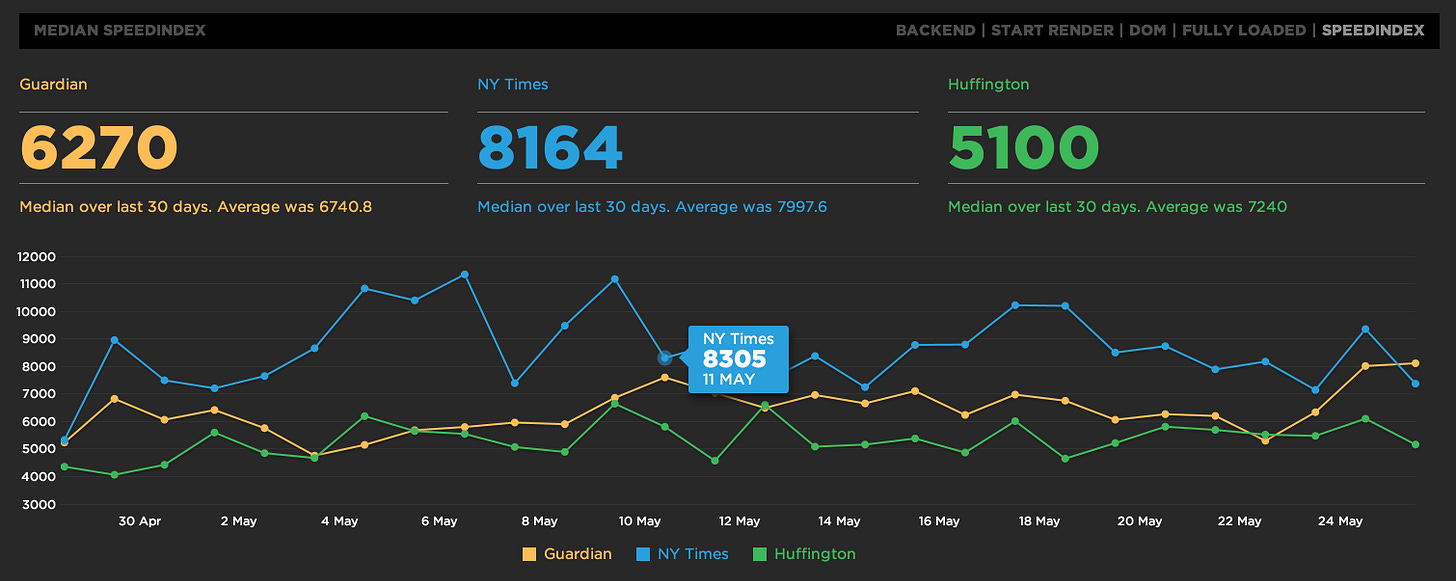Kiwi-founded Foxglove Raises US$40m Series B
Plus: SpeedCurve acquired by US company Embrace
Happy Thursday!
This is the day we typically go around the world for global startup / tech news…but as it turns out, there’s a few notable things happening in God’s Own so I’m gonna keep this mostly local. At the risk of sounding naff, it’s a credit to the cool things Kiwi startups are doing that I just can’t ignore them.
Here’s what’s brewing in your Daily Shot:
Kiwi-founded Foxglove Raises US$40m Series B
SpeedCurve acquired by Embrace
Tonight: I Wish I Knew with James Sampson
The Easiest (and Hardest) Places to Hire Freelancers
Report: AI business use still largely in pilot phase
A massive thank you to our paid subscribers and supporters - we’re a startup like many of you are, and your backing makes it all possible. Legends.
Nick and the CAFFEINE team
Kiwi-founded Foxglove Raises US$40m Series B: Chalk this one up as a significant step towards robots coming into our daily lives. Foxglove is co-founded by Kiwi Adrian Macneil (along with Roman Shtylman, who deserves a shout out too, I guess), and essentially they build the software behind things like self-driving cars, warehouse robots and other autonomous systems.
The funding round was led by Bessemer Venture Partners, with support from Icehouse Ventures, among others. It’s all about enabling them to power and scale the future of "physical AI”. It’s labelled a “generational platform shift - at least as impactful as mobile computing or cloud infrastructure.”
Congratulations also to Icehouse Principal Mason Bleakley for getting two quotes in two days in this newsletter: “Like any frontier technology, there’s always a lot of froth to work through as investors, but Adrian and his team have developed tools which deliver genuine value to the leading companies in physical AI…
“[Adrian has] quickly become one of the most important emerging leaders in this space. For us, it’s not just a chance to back the best Kiwis, but for New Zealand investors to be able to share in the success of our brightest entrepreneurs like Adrian around the world.”
SpeedCurve acquired by Embrace: SpeedCurve is a bootstrapped SaaS business co-founded by Kiwi Mark Zeman 12 years ago, and it’s now been sold to US company Embrace for an undisclosed sum.
A big thank you to Mark for filling us in, and a huge congratulations for achieving an exit. He also raises a great point: “VC investments and big exits always get the media coverage, and I feel like there are plenty of bootstrapped companies and game studios that fly under the radar but contribute a lot to NZ.”
As a purveyor of VC investments and exits, we won’t apologise for giving them coverage (not that I think that’s what he wants), but it’s worth noting that we welcome and encourage any founder, VC-funded, bootstrapped or otherwise, to get in touch whenever you have news to share. We can’t always cover everything, but we really do love to know what people are doing in all their different shapes and sizes.
Event: I Wish I Knew with James Sampson: We’re stoked to be able to put up the Sold Out sign on yet another event. We (and by ‘we’ I mean our events ace Georgia) have heard your feedback and your enthusiasm for in-person events and it’s super rewarding to see that they’re resonating.
Tonight’s I Wish I Knew with FileInvite James Sampson will no doubt be another demonstration of the power of sharing experiences. Nobody knows the founder life like other founders, especially when it comes to things like growing SaaS businesses, expanding internationally and dealing with all the ‘little’ things that you have to deal with along the way.
A shout out to our sponsors Proxi and Kea who deserve much more than a pithy sentence here - we so appreciate how you’ve made this happen.
The Easiest (and Hardest) Places to Hire Freelancers and How New Zealand Stacks Up
Most stories we cover here at Caffeine are, fundamentally, about identifying a universal problem and the people creating a thriving business by providing the solution.
In our second partner series with Remote, the problem in question is clear: The world has never had more people ready to work for themselves, yet hiring them across borders has also never been more complicated.
For startups, especially Kiwi ones living that mantra of ‘go global from day one’, freelancers have become an essential growth lever.
They bring flexibility, affordability, and access to global skillsets once out of reach. But behind the promise of ‘hire anyone, anywhere’ lies a mess of regulations that differ in every country, and a single mistake in classification can cost founders dearly.
Remote’s recent Global Workforce Report 2025 found that 73% of business leaders globally have faced compliance challenges when hiring in another country. Of that number, 51% were engaging talent as an independent contractor or freelancer.
“It’s unfortunate,” says Nick Martin, APAC GTM Lead at Remote. “Modern tools have made it easy for people to work anywhere. But the regulation and legislation haven’t changed at the same pace to make it easy for companies to hire them.”
This is one of the global pain points which inspired Remote, the company Job van der Voort co-founded with Marcelo Lebre in January 2019. Their mission was straightforward but ambitious: to open the world for every person, business, and country by removing the obstacles that prevent companies from hiring globally.
For Remote, solving for this particular obstacle starts with something deceptively simple: what even counts as a “freelancer”?
“Every government has built its own definition of what makes someone a freelancer versus a contractor, and very few of them agree,” says Martin.
“Some focus on who sets the hours or who owns the tools. Others look at tax residency or payment frequency. The result can be a headache for founders. What counts as a freelancer in New Zealand might count as a full-time employee in France.”
In practice, that means a Kiwi founder hiring a freelance developer in Berlin or a designer in São Paulo is stepping into a legal minefield, and mistakes can result in penalties and fines.
With this in mind, where are the easiest (and hardest) countries to hire freelancers?
“The easiest markets to hire freelancers share a few traits: transparent tax regimes, clear worker classification standards, and efficient banking infrastructure,” says Martin. “Countries like the United Kingdom, Canada, Australia and, luckily, New Zealand score well on all three. Contractors are recognised as independent businesses, payment systems are stable, and local compliance requirements are well defined.”
By contrast, markets like Germany and Spain remain challenging, where authorities frequently reclassify freelancers as employees under “false self-employment” rules. In those countries, companies risk back-paying years of benefits and taxes, or even being hit with penalties worth tens of thousands of dollars for a single misstep.
“The EU is tightening these definitions even further,” Martin adds. “The intent is good, we all want to protect workers, but it makes hiring across borders extremely high-stakes for small businesses.”
That tension has given rise to a new generation of platforms designed to shoulder those risks. Remote’s Contractor Management and Contractor of Record products provide the infrastructure to stay compliant when hiring and onboarding freelancers. This covers complexities like insurance coverage tax benefits, payments in local currency, and ensuring people get paid on time. For HomeProject, a Norwegian company that runs crowdsourcing projects, this was a major challenge given they hire over 400 contractors and need payouts in different currencies.
Erik Sveen, founder and CEO of HomeProject, said, “We work with 460+ contractors. I’d need to employ 5 or 6 people full time to keep on top of compliance, manage individual invoices, work with accountancy firms and make payments in multiple currencies. Remote has definitely been a timesaver and a money saver for us in providing a summary of the total invoiced amount each month. I pay in one currency and contractors have the flexibility to choose what currency they want to have in their account. That means we’re avoiding a lot of transaction and foreign currency fees, while paying our contractors the ways they want to be paid.”
Cecilia Nilsson-Martin, a contractor at The Home Project, gave her perspective on using Remote: “The freedom of being a freelancer is more important than anything else for me. I could never go back. Working with a client that uses Remote is more secure as a contractor because of all the checks and compliance from both sides. And everything is so simple: from agreeing to the contract, to raising invoices and getting paid in the currency I want, everything is in one place. It’s also easy to pull your own records for bookkeeping, which saves me so much time.”
New Zealand’s position in this landscape is relatively strong. Our country’s tax system and freelancer rules are among the clearest in the world, and its workforce has embraced independent contracting at pace. But the moment Kiwi companies look offshore, the complexity multiplies.
“The real scarcity New Zealand founders face isn’t capital - it’s time,” says Martin, Remote’s APAC GTM Lead. “You can’t manage five currencies, three legal systems and ten invoices manually forever. That’s where tools like ours step in.”
For a new generation of founders, freelancers aren’t there to paper over cracks, they’re a core part of the team. That demands systems built for both speed and trust.
“The future of work isn’t one model or the other,” Martin says. “It’s being able to easily hire both employees and freelancers to suit your particular needs but all managed under one roof.”
That’s the long-term vision Remote is chasing: a unified global employment infrastructure that simplifies compliance, makes payments instantaneous, and opportunity universal.
For founders in New Zealand, the world is at our doorstep, but accessing it is far from frictionless. Freelancers can unlock growth, speed and scale, but only if the foundations are right.
“The best talent might live a hemisphere away,” Martin says. “The question isn’t whether you can hire them. It’s whether you can do it without your infrastructure collapsing under the paperwork.”
And that’s the future Remote is building toward, where hiring across the world feels as simple and compliant as hiring across the street.
Report: AI business use still largely in pilot phase: This report from McKinsey is a few days old, but it’s a useful snapshot of AI use at this moment in time. Among the key takeaways is the fact that, while 9/10 businesses say they’re using AI regularly, the majority haven’t embedded them deeply enough to realise material benefits at an enterprise level.
Between growing pains and figuring out how to scale pilot programmes, there’s a sense that AI isn’t being fully utilised - yet. This might just be confirming what many people already know, but given how common AI use is already, the fact we’re not yet at “material benefit” level does show how dramatically things are about to change.
It’s a typically thorough report from arguably the world’s leading thought leadership authority and offers useful clues on where the opportunities are, how people are using AI and perceptions on its impact, both now and in the coming years. Read the full report here.
That’s it for today, thanks for reading. Want to get in touch with a news tip, bit of feedback or just to chat? Email hello@caffeinedaily.co










